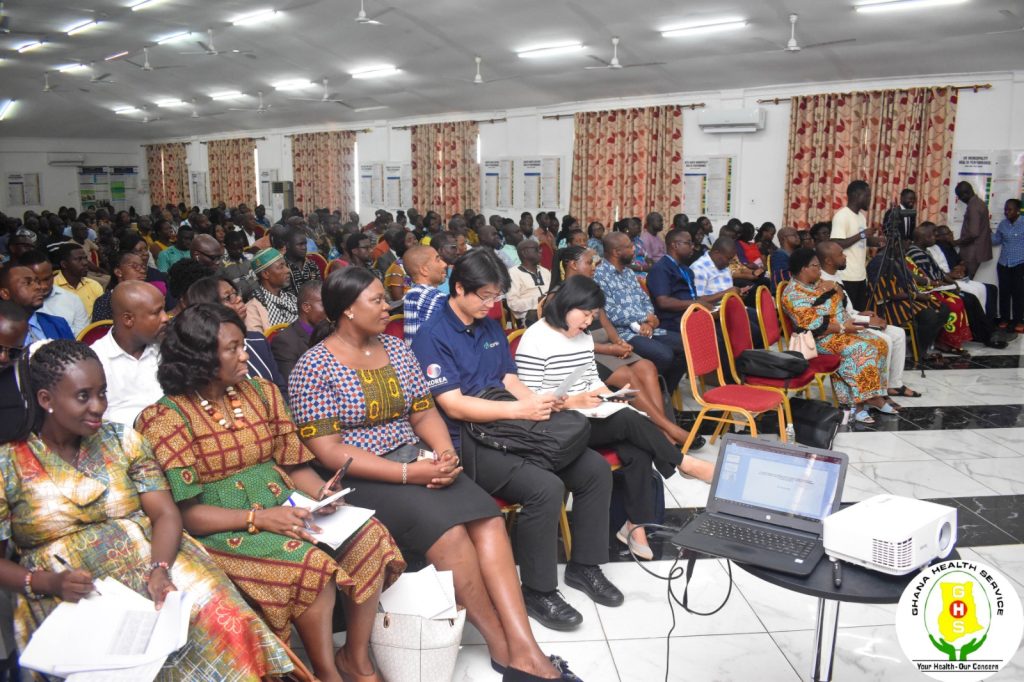By Maxwell Awumah
Ho, March 29, GNA-Dr Tinorgah Awudu, a Senior Health Consultant has said the nationwide rollout of the Networks of Practice (NoPs) was to significantly enhance service delivery through the primary Healthcare system, especially at the sub-district and community levels.
He said NoPs were deliberately designed to build networks of health facilities at the sub-district level and support them to better work optimally to strengthen public healthcare.
Dr Awudu made these remarks at the opening of a two-day Volta Regional 2023 Annual Performance Review Conference in Ho.
It was under the theme: “Strengthening the Primary Healthcare System for Improved Access to Quality Health Service Delivery: The Role of Networks of Practice (NoPs).”
He said the NoPs are expected to reduce the cost of getting healthcare, bring quality outcomes to the population and reduce the burden of health seekers towards actualising the goals of Universal Health Coverage by 2030.
He said the upgrade of health infrastructure, including health centres and Community-based Health Planning Systems (CHPS), would expand reach and build team dynamics to address complex situations at the base.
He praised stakeholders in the Volta region as pacesetters of the NoPs initiative and called for proper decentralisation across the region and country at large for optimal success.
He re-emphasised moving from service delivery and being clinical towards providing quality care.
Dr Patrick Kumah Aboagye, Director-General of the Ghana Health Service (GHS), in a speech read for him by Mr Mustapha Hamidu, Director of Finance (GHS), said the Service had deployed some innovations that were yielding significant improvements in key indicators.
He mentioned the hospital admission rate rising to 65.6 per cent in 2023 from 63.2 per cent in 2021 with the percentage of clients making the fourth visit increasing to 87.1 per cent in 2023 from 74 per cent in 2020.

Again, he said the percentage of malaria cases tested rose from 98.3 in 2023 to 93.8 in 2019 with the percentage of family planning acceptor rate making a rise of 35.8 in 2023 from 27.1 in 2020 and the percentage of breastfeeding after one hour of delivery rising to 94.9 in 2023 from 92 in 2020.
He disclosed that the stillbirth rate took a dip from 12.6 per 100, total births in 2019 to 10.2 per 1,000 total births in 2023 with the institutional Neonatal mortality rate per 100,000 live births, which stood at 7.7 per 100,000 live births in 2019 declining considerably to 5.1 in 2023.
Dr Kumah Aboagye, however, said out-patient-department per capita, institutional infant mortality, institutional under-five mortality, percentage of skilled delivery, institutional maternal mortality ratio and all immunisation coverage have been stagnant and pledged drastic measures to address the situation.
The D-G indicated the Service had altered its strategy from malaria control to Elimination, sustained the medical drone delivery service and the introduction of the electronic integrated Disease Surveillance and Response(E-IDSR) platform.
He said the biometric registration for vaccination using Simprints technology with the e-tracker among others had integrated supportive supervision.
He said the launch of the flagship Networks of Practice approach and the Ghana Health Service Institute was expected to revamp and strengthen primary health systems.
Dr Kumah Aboagye commended health workers across the board for their sacrifices and dedication to duty and development partners for their support.
Dr Chrysantus Kubio, the Volta Regional Director of GHS, said that the region’s health delivery system scored 3.8 out of a maximum of five scores, which still gave the region the opportunity to be amongst the best-performing regions in Ghana.
He said its institutional maternal ratio rates increased from 82 deaths per 100,000 live births to 97 deaths per 100,000 live births in 2023.
He said there was a dip in the percentage of HIV-infected infants born to HIV mothers from 4.2 in 2021 to 2.4 in 2022 and 1.9 in 2023 as well as the anti-retroviral coverage rate standing at 58.6 per cent far below the targeted 90 per cent.
Dr Kubio indicated the region fell below the national vaccination target though marginally improving in 2023 and urged stakeholders to come on board to reverse the trend.
He said the region had maintained an impressive performance in financial management of the various budget outlines and lauded the contributions of the region’s health workers.
Professor Frank Ekow Baiden, Dean of Fred Binka School of Public Health, University of Allied Health, who presided, said lessons that were learnt in the NoPs initiative must evolve to deepen success at the sub-districts.
There were solidarity messages from development partners including the Korea Foundation for International Health (KOFIH) USAID Q4H, PATH, UNICEF, WHO, CHEMONICS, Clinton Health Access Initiative (CHAI) Global Communities, MTN Foundation and NGOs in Health.
GNA